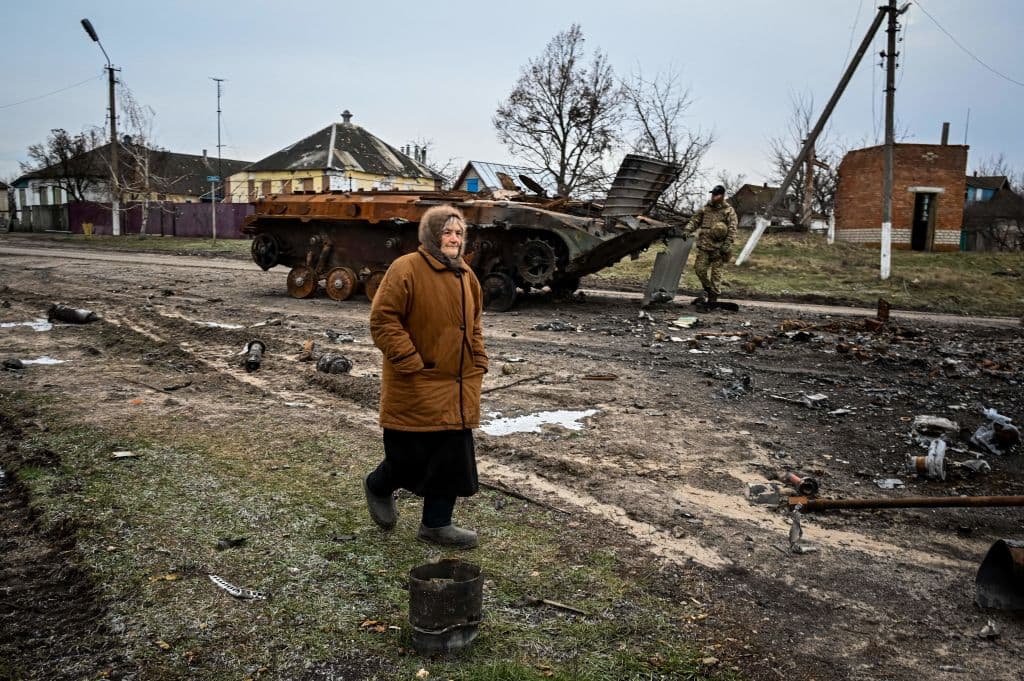Ukraine war latest: Ukraine says Russia plans new major offensive in early 2023

Key developments on Dec. 15:
- Ukrainian officials predict Russia to launch new major offensive in January-February 2023
- Zaluzhnyi: Russia likely to attempt capturing Kyiv again, trains 200,000 new soldiers
- European Parliament recognizes Holodomor as genocide against Ukrainian people
- Prosecutors: Paramedic, elderly man killed during Russian shelling in Kherson
Russia appears to be training as many as 200,000 conscripts to launch a new major offensive in early 2023, which could include another attempt at capturing Kyiv, according to senior Ukrainian officials.
In a rare interview published on Dec. 15, Commander-in-Chief Valerii Zaluzhnyi told the Economist that Russia's mobilization "has worked" and still posed a "problem" for Ukraine, regardless of its equipment shortage.
"The Russians are preparing some 200,000 fresh troops," Zaluzhnyi told the Economist. "I have no doubt they will have another go at Kyiv."
Zaluzhnyi estimated that the Russian leadership had spent around four years gathering several months' worth of resources (soldiers, equipment, and ammunition) to achieve their goals, but it wasted its potential "without achieving practically any result."
While Russia had thrown whatever resources it had left in the Donbas, it is likely seeking ways to pause the fighting "by any means" so it can recover its troops and "create new potential" to achieve its goals, the army chief added in the interview.
Russia is also "constraining" Ukrainian troops across the battlefield not to give them time to regroup, wearing them down with heavy fighting, Zaluzhnyi said, quoted by the Economist. But the Donbas is still "a no-win situation for the Russian army," he added.
Zaluzhnyi's assessment comes three months after Russian President Vladimir Putin on Sept. 21 declared a mobilization of troops, first since World War II.
Putin said last week that around 150,000 conscripts were already deployed to Ukraine, likely thrown on the front lines without adequate training.
Ukraine says 150,000-200,000 conscripts that hadn't yet been deployed are likely undergoing training.
Speaking to the Guardian, Ukraine's Defense Minister Oleksii Reznikov said that "approximately" 150,000 conscripts are undergoing "a minimum of three months" of training at different camps before "the next wave" of a broad offensive from multiple directions.
Reznikov said it could begin in February.
Zaluzhnyi and Reznikov's comments echoed a similar assessment made by Foreign Minister Dmytro Kuleba earlier this week, where he said at a briefing that there are possibilities that Russia will launch a "big" offensive "somewhere in late January-February."
Moscow has not commented on Kyiv's claims.
Punishing Russia
Russian Parliament on Dec. 15 adopted in the first reading a draft law that would abolish criminal liabilities for war crimes committed in Russian-occupied territories of Ukraine if they were done "in the interests of Russia."
Ukrainian prosecutors say that over 53,000 Russian war crimes were documented across the country.
Presidential advisor Mykhailo Podolyak called it "an actual legalization of looting, rape, and murder."
From the Bucha massacre to Russia's brutal siege of Mariupol that killed tens of thousands of civilians, there is mounting evidence of Russian war crimes nationwide.
Russian troops have murdered, abducted, tortured, raped, and kidnapped civilians regardless of age.
Ukraine is urging the European Parliament to begin an UN-backed special tribunal to punish Russia for "its terrorist war." There's an ongoing investigation by the International Criminal Court (ICC).
European Parliament recognizes Holodomor as genocide
The European Parliament has adopted a resolution recognizing Holodomor, the man-made famine of Ukrainians ordered by the Soviet authorities in 1932-1933, as genocide of the Ukrainian people.
The European Parliament members "strongly condemn these acts, which resulted in the deaths of millions of Ukrainians, and call on all countries and organizations that have not yet done so to follow suit and recognize it as genocide," reads the resolution.
The whitewashing and glorification of the Soviet regime and the rebirth of the dictator Joseph Stalin's cult "have led to Russia being today a state sponsor of terrorism," the parliament members said.
So far, 20 countries have recognized Holodomor as such, including the Czech Republic, Romania, Ireland, Moldova, and Germany.
Front line update
Kyiv's successful counteroffensive appears to have forced Russia to give up the "seizure of Ukraine" and focus on the Donbas instead, according to Oleksiy Hromov, deputy chief of the General Staff's main operational department.
Speaking at a news conference, Hromov said on Dec. 15 that Ukrainian troops had advanced one and a half kilometers near Kremmina in occupied Luhansk Oblast.
Meanwhile, Russia's renewed shelling of Kherson killed two people – a paramedic and an elderly man, regional prosecutors reported.
The shells hit the central part of the liberated southern city, damaging residential buildings, and a bus came under fire, they added.
Regional official Yuriy Sobolevsky said on TV that about 200 people are fleeing Kherson daily as Russia intensifies its shelling of the city it lost amid Kyiv's months-long counteroffensive.
In other regions, a 65-year-old man was killed during Russia's artillery attack in the central Dnipropetrovsk Oblast, while two civilians were killed over the past day in the eastern Donetsk Oblast, near the embattled city of Bakhmut.










